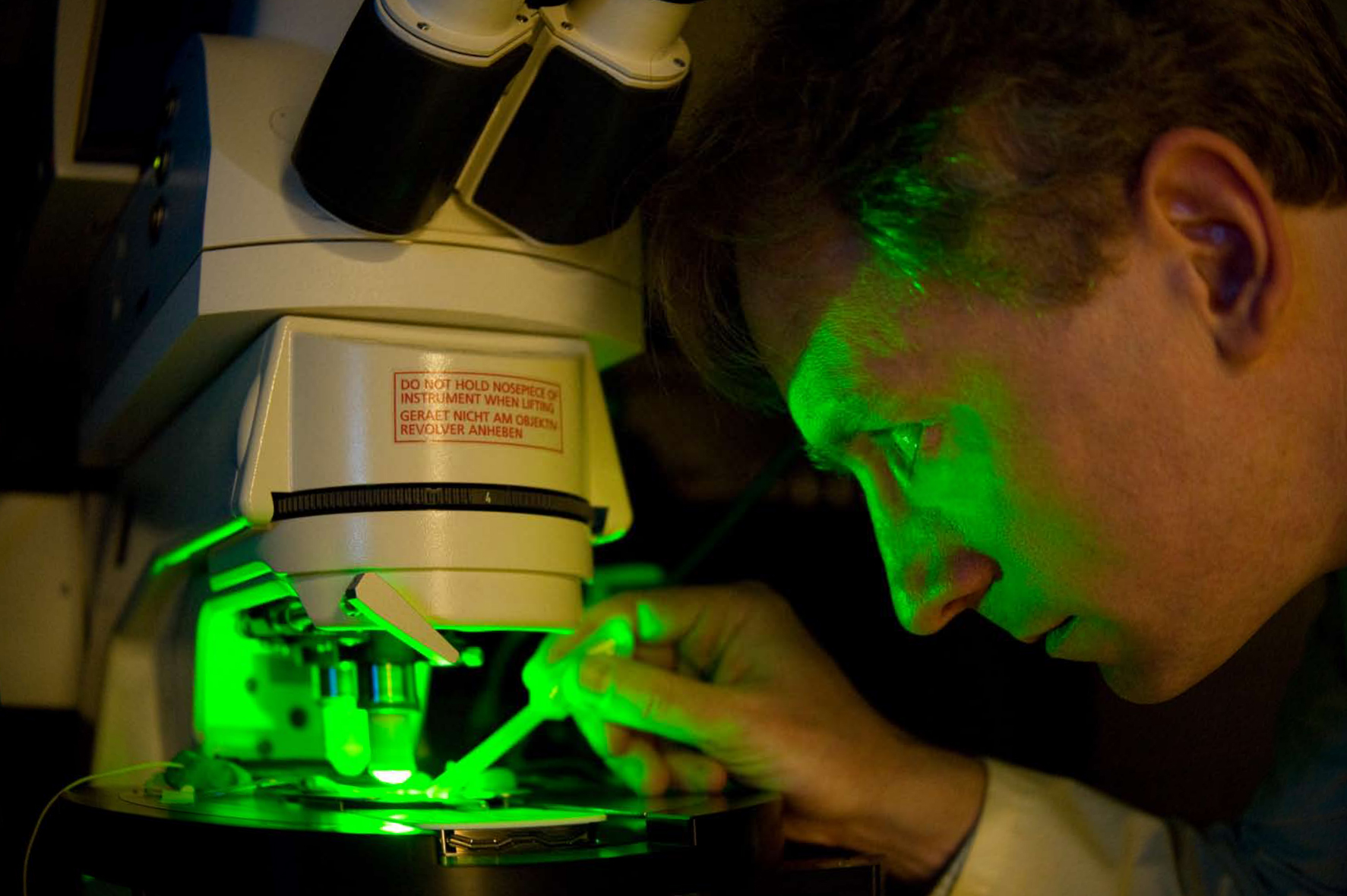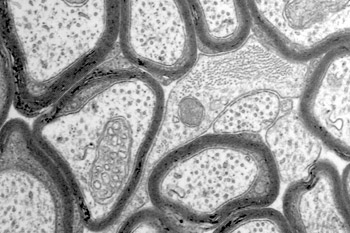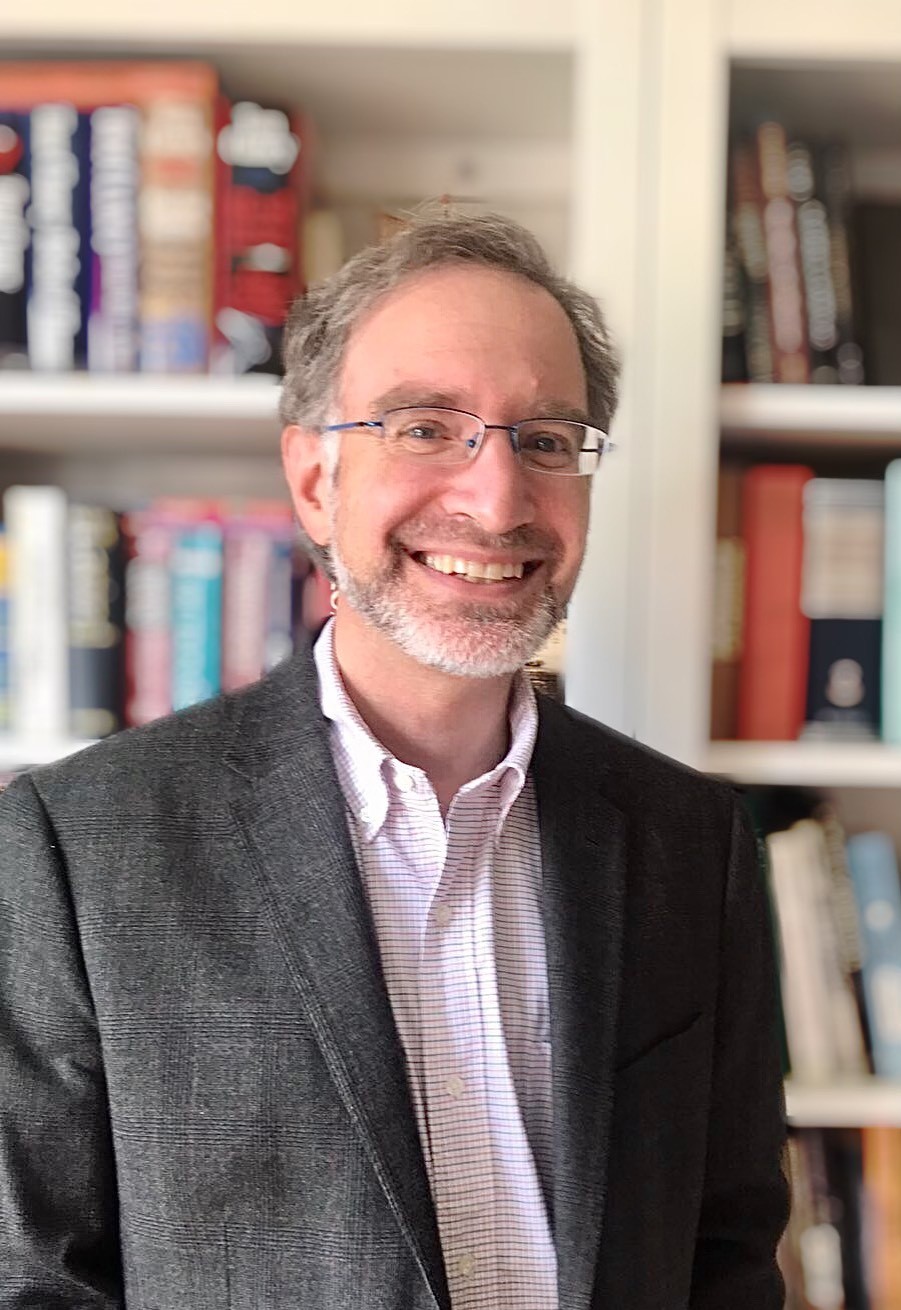Neuroscience
Neuroscience Ph.D. Program
 Fostering collaboration and creativity, the Neuroscience Ph.D. program at VCU is an opportunity for students to explore a broad range of disciplines related to neuroscience.
Fostering collaboration and creativity, the Neuroscience Ph.D. program at VCU is an opportunity for students to explore a broad range of disciplines related to neuroscience.
Our uniquely interdepartmental, integrated curriculum provides students with a core of knowledge of the basic structure and function of the central nervous system while allowing flexibility in choosing their advisors, electives and specialized areas of research.
Students function as independent research investigators after completing their required didactics, and upon graduation will be equipped to conduct independent research and teach in the neuroscience disciplines at a university or academic health center.
Resources
Supporting our students is at the core of the School of Medicine's mission. We provide a wide variety of resources to help enhance our graduate students' experience and ensure their safety, as well as resources to support our faculty.
Research
We encourage our students to explore a variety of neuroscience research areas before committing to a mentor and a research laboratory. Research groups include:
- Drug abuse and mental illness
- Glial cell biology
- Injury, repair and degeneration
- Plasticity and development
- Channels, receptors and transporters
Curriculum
 Students enter doctoral training via the Biomedical Sciences Doctoral Portal, which allows them to remain uncommitted to a department or program until transitioning at the end of the first year of study. Students may choose to concentrate in neuroscience from the beginning or select the doctoral program in neuroscience after exploring opportunities in other departments and programs.
Students enter doctoral training via the Biomedical Sciences Doctoral Portal, which allows them to remain uncommitted to a department or program until transitioning at the end of the first year of study. Students may choose to concentrate in neuroscience from the beginning or select the doctoral program in neuroscience after exploring opportunities in other departments and programs.
Exam Schedule
Candidacy exams occur in two parts, typically after the second year for Ph.D. students and the first graduate year for those on the M.D./Ph.D. track. Students should complete both parts by the end of their third-year fall semester, and M.D./Ph.D. students should complete both parts by their second graduate year.
Part One
Students write a mini-review paper and defend it before their graduate advisory committee.
Part Two
In consultation with their advisors, students prepare an NIH-style grant proposal and oral defense before their graduate advisory committee. We strongly encourage students to submit their proposals for extramural funding, such as NIH predoctoral fellowships, when appropriate.
Current Students
- Belle Buzzi
Thesis Advisor: M. Imad Damaj, PhD
Department of Pharmacology and Toxicology - Samantha Gottlieb
Thesis Advisor: Michael Miles, MD, PhD
Department of Pharmacology and Toxicology - Annalise Hasan
Thesis Advisor: Peter Hamilton, PhD
Department of Anatomy and Neurobiology - Kijoon Kim
Thesis Advisor: Peter Hamilton, PhD
Department of Anatomy and Neurobiology - Jessica Maltman
Thesis Advisor: Javier Gonzalez Maeso, PhD
Department of Physiology and Biophysics - Soha Munir
Thesis Advisor: Sandeep Singh, PhD
Department of Biochemistry and Molecular Biology - Nima Nassehi
Thesis Advisor: Dana Selley, PhD
Department of Pharmacology and Toxicology - Kelly Platfoot
Thesis Advisor: Andrew Ottens, PhD
Department of Anatomy and Neurobiology - Vera Purcell
Thesis Advisor: Jennifer Wolstenholme, PhD
Department of Pharmacology and Toxicology - Chloe Simons
Thesis Advisor: Pamela Knapp, PhD
Department of Anatomy and Neurobiology - Maya Gaines-Smith
Thesis Advisor: Javier Gonzalez Maeso, PhD
Department of Physiology and Biophysics - Corinne Smith
Thesis Advisor: Peter Hamilton, PhD
Department of Anatomy and Neurobiology - Michelle Taylor
Thesis Advisor: Kirsty Dixon, PhD
Department of Surgery - Natalie Truby
Thesis Advisor: Peter Hamilton, PhD
Department of Anatomy and Neurobiology - Susie Turkson
Thesis Advisor: Gretchen Neigh, PhD
Department of Anatomy and Neurobiology - Amy Wegener
Thesis Advisor: Gretchen Neigh, PhD
Department of Anatomy and Neurobiology
Program Alumni
2025
Amy Wegener
Dissertation Title: Exploring the Neural Consequences of Stress and Inflammation in a Monogamous Rodent: a Path to Understanding Loss
Kelly Platfoot, Ph.D
Dissertation Title: Interrogating the Endogenous Peptidome for Biomarkers of Traumatic Brain Injury
2024
Maria Alexis Bent, PhD
Dissertation title: Memory impairments due to binge ethanol are impacted by age and sex
Martina Hernandez, PhD
Dissertation title: Mechanistic insight into traumatic brain injury-induced neuronal membrane disruption: Cathepsin B relocalization and a NeuN negative cortical neuron subpopulation
Jyoti Lodha, PhD
Dissertation title: Behavioral effects of adolescent social isolation stress and/or binge drinking following DREADD manipulation of vHip to mPFC neurons
Namrata Tiwari, PhD
Dissertation title: Satellite glial cells facilitate chronic mechanical hypersensitivity involving Piezo2 upregulation in DRG neurons
2023
Elizabeth Dustin, PhD
Dissertation title: Unraveling the consequence of adult onset sulfatide depletion: its implications in myelin and axonal heath in the context of neurodegenerative disease
Kelly Flounlacker, PhD
Dissertation title: Effects of HIV-1 Tat and opiates on gene regulation of oligodendrocyte lineage cells: Identification of Myrf as a novel target
Alan Harris, PhD
Currently in the medical phase of the MD/PhD program
Dissertation title: Vulnerability and adaptation of neocortical neuron subtypes after concussive traumatic brain injury
2022
Yu Tzu (Rita) Chen, PhD
Dissertation Title: TRP to the reward center: muscarinic excitation of VTA dopamine neurons via activation of a non-selective cation conductance
Gladys Shaw, PhD
Dissertation Title: Enduring consequences of chronic repeated stress on neuro-metabolic function
Nicole Weston, PhD
Dissertation Title: The injury-induced neurogenic response and the role of Notch1 in regulating this process
Rory Weston, PhD
Dissertation Title: Role of CLIC4 and the synaptic transcriptome in the behavioral and molecular neurobiology of ethanol
2021
Justin Saunders
Dissertation title: Glucocorticoid receptor dysregulation underlies 5-HT2A receptor-dependent synaptic and behavioral deficits in a mouse neurodevelopmental disorder model
Rudy Toneatti, PhD
Dissertation title: Interclass GPCR heteromerization affects localization and trafficking serotonin 5-HT2A and mGlu2 receptors organization and trafficking
2020
Aaron Barbour, PhD
Dissertation title: KCC2: a novel therapeutic target to rescue GABAergic dysfunction and behavioral deficits induced by HIV and opiate use
Nicole Ekanem, PhD
Dissertation title: Focal augmentation of somatostatin interneuron function and subsequent circuit effects in developmentally malformed, epileptiform cortex
Vishal Patel, MD, PhD
Dissertation title: Recovery from visual dysfunction following mild traumatic brain injury in the mouse is associated with adaptive reorganization of retinal inputs to the lateral geniculate nucleus
Samantha Spencer, PhD
Dissertation title: LPA receptors modulate gene expression during oligodendrocyte differentiation
Rory Weston
Dissertation title: Role of CLIC4 and the synaptic transcriptome in the behavioral and molecular neurobiology of ethanol
2019
Kristen Lee, PhD
Dissertation title: Glial cell mechanisms regulate alcohol sedation in Drosophila melanogaster
Pavel Lizhnyak, PhD
Dissertation title: Enhanced proteomics resolves KCC2 as a novel therapeutic target for traumatic brain injury
Sarah Kim, MD, PhD
Dissertation title: Role of glial CCR5 in mediating HIV-1 TAT and opiate neurotoxicity and behavioral phenotype
Megan Sayyad, PhD
Dissertation title: The role of Syndecan-1 and extracellular vesicles in breast cancer brain metastasis
Tyler Steele, PhD
Dissertation title: Structural determinants of high potency MDPV inhibition of the dopamine transporter
2018
Samantha (Brookins) Benusa, PhD
Dissertation title: Mechanisms regulating axon initial segment stability
Amr Ellaithy, MD, PhD
Dissertation title: Metabotropic glutamate receptor 2 activation: computational predictions and experimental validation
Vinay Idikuda, PhD
Dissertation title: Regulation of HCN channel function by direct camp binding and singlet oxygen
Guoqing Xiang, PhD
Dissertation title: Signaling through homomeric and heteromeric cannabinoid CB1 receptors
2017
Tuoxin Cao, PhD
Dissertation title: Hydrogen peroxide and pharmacological agent modulation of TRPV2 channel gating
Robin Chan, PhD
Dissertation title: Epigenetic editing to validate findings from methylome-wide association studies of neuropsychiatric disorders
Kareem Clark, PhD
Dissertation title: Altered axon initial segment structure and function in inflammatory disease
William Marks, PhD
Dissertation title: The effects of the HIV-1 Tat protein and morphine on the structure and function of the hippocampal CA1 subfield
Nicolas Russell, MD, PhD
Dissertation title: Heme oxygenase 1 expression after traumatic brain injury and effect of pharmacological manipulation on functional recovery
Michel Vascak, MD, PhD
Dissertation title: Structural and functional alterations in neocortical circuits after mild traumatic brain injury
2016
Joyce Balinang, PhD
Dissertation title: Human neural progenitor cells are productively infected by R5-tropic HIV-1: opiate interactions on infection and function involve Cdk5 signaling
Kristen Davis, PhD
Dissertation title: A neural circuit of appetite control in c. elegans
Melissa Powell, PhD
Dissertation title: The role of matrix metalloproteinase 9 and osteopontin in synaptogenesis and reinnervation of the olfactory bulb following brain injury
Natalie (Allen) Wheeler, PhD
Dissertation title: Autotaxin in central nervous system development and disease
Jason Younkin, PhD
Dissertation title: Allosteric effects of g-protein coupled receptor heteromerization: relevance to psychosis
2015
Matthew Baer, MD, PhD
Dissertation title: Elucidating the role of endogenous electric fields in regulating the astrocytic response to injury in the mammalian central nervous system
Shiping (Patrick) Zou, PhD
Dissertation title: Effects of HIV-1 viral protein tat on the viability and function of oligodendroglial cells
2014
Ruturaj Masvekar, PhD
Dissertation title: HIV-1 and opiate mediated neurotoxicity: GSK3beta is a potential therapeutic target
Thomas Taetzsch, PhD
Dissertation title: NF-kB p50: The role of redox signaling and loss of function in dysregulated microglial activation
2013
Ahmad Altarifi, PhD
Dissertation title: Effects of mu opioid receptor agonists on intracranial self-stimulation in the absence and presence of “pain” in rats
Justin Brooks, PhD
Dissertation title: A molecular mechanism regulating the timing of corticogeniculate innervation in dLGN
Julie Chan, MD, PhD
Dissertation title: Osteopontin expression during the acute immune response mediates reactive synaptogenesis and adaptive outcome
John Greer, MD, PhD
Dissertation title: The characterization of the anterograde and retrograde consequences of traumatic axonal injury in a mouse model of diffuse brain injury
Matthew Lazenka, PhD
Dissertation title: THC-mediated induction of delta-fosB and its modulation of CB1R signaling and adaptation
Jiaqiong (Joan) Wang, MD, PhD
Dissertation title: Diffuse traumatic axonal injury within the visual system: implications for visual pathway reorganization
2012
John Campbell, PhD
Dissertation title: The role of calcineurin in dendritic remodeling and epileptogenesis in a rat model of traumatic brain injury
William (Alex) Foxworthy, PhD
Dissertation title: Unique features of organization and neuronal properties in a multisensory cortex
Yun-Kyung Hahn, PhD
Dissertation title: CNS neural/glial progenitors as targets of HIV-1 and opiates: effects on proliferation and population dynamics may alter behavior outcomes
Crystal Lantz, PhD
Dissertation title: Effects of early alcohol exposure on ocular dominance plasticity in mice
Peter T. Nguyen, PhD
Dissertation title: Cannabinoid receptors in the 3D reconstructed mouse brain: function and regulation
Arco Paul, PhD
Dissertation title: Overexpression of serum response factor in astrocytes restore ocular dominance plasticity in a model of fetal alcohol spectrum disorders
Tania Seabrook, PhD
Dissertation title: Circuit development in the dorsal lateral geniculate nucleus (dLGN) of the mouse
Julie Ziobro, PhD
Dissertation title: Characterization and development of a stroke-induced model of acquired epilepsy in organotypic hippocampal slice cultures: role of the cannabinoid CB1 receptors in modulation of neuronal excitation and inhibition
2011
Andrew Bell, PhD
Dissertation title: Age dependent spatial characteristics of epileptiform activity in malformed cortex
Rana El-Danaf, PhD
Dissertation title: Developmental remodeling of relay cells in the dorsal lateral geniculate nucleus (dLGN) of the mouse and the role of retinal innervation
Nisha Nagarkatti, MD, PhD
Dissertation title: Inhibition of the calcium plateau following in vitro status epilepticus prevents the development of spontaneous recurrent epileptiform discharges
Larra Yuelling, PhD
Dissertation title: Autotaxin: a regulator of oligodendrocyte differentiation
2010
Emily Dilger, PhD
Dissertation title: Role of synaptically evoked plateau potentials in retinogeniculate development
Audrey (Forrest) Lafrenaye, PhD
Dissertation title: Focal adhesion kinase, a major regulator of oligodendrocyte morphological maturation and myelination
2009
Sheine Schanuel, PhD
Dissertation title: Heterologous expression and subcellular targeting of the invertebrate FMRFamide-gated sodium channel (FaNaC) in different subtypes of mammalian neurons
2008
Michelle Hoot, PhD
Dissertation title: The effect of chronic constriction injury on cellular systems within nociceptive pathways in the mouse
Jennifer Wolstenholme, PhD
Dissertation title: Behavioral and molecular analysis of individual variation in ethanol drinking
2007
Jonathan E. Kurz, MD, PhD
Dissertation title: Pathological upregulation of a calcium-stimulated phosphatase, calcineurin, in two models of neuronal injury
2006
Katherine Sayers, PhD
Dissertation title: Functional redistribution of hippocampal cannabinoid CB(1) receptors in the rat pilocarpine model of acquired epilepsy
2005
Mary Cage, MD, PhD
Dissertation title: Molecular characterization of mesocorticolimbic brain regions in DBA/2J mice sensitized to the locomotor activating effects of ethanol
2003
Amanda Mower, PhD
Dissertation title: Cyclic AMP response element-binding protein in ocular dominance plasticity
Cristina Falo, PhD
2002
David A. Sun, MD, PhD
Life in Richmond
Urban life with a small-town feel
We encourage our graduate students to maintain a healthy work-life balance, and Richmond is a wonderful place to engage in that well-rounded lifestyle. As the capital of Virginia since 1779, Richmond attracts students, faculty and staff from around the globe. The city’s location affords easy day trips to destinations like Washington, DC, Virginia Beach, Colonial Williamsburg and the Blue Ridge Mountains, among others.
As a mid-sized city with a metropolitan population of 1.3 million, Richmond provides stimulating activities while maintaining its intimate feel and unique vibe. Vibrant neighborhoods offer distinct, diverse experiences, with no shortage of art galleries, museums, music venues, restaurants, breweries and parks. For the outdoor enthusiast, you can’t beat the offerings in the city’s riverfront parks and urban wilderness areas such as white-water rafting, hiking, mountain biking and festivals.
Learn more about our communityHow to Apply
The Neuroscience Ph.D. program typically admits five to seven students per year, with financial support including a living stipend plus tuition and fees for the duration of their training.
The application is available through the Biomedical Sciences Doctoral Portal. If you have any questions about the program or application requirements, please contact:
Contact Us
Contact for programmatic questions:
Andrew Ottens, Ph.D.
Neuroscience Graduate Program Director
Email: andrew.ottens@vcuhealth.org
John Bigbee, Ph.D.
Neuroscience Director of Admissions
Email: john.bigbee@vcuhealth.org


